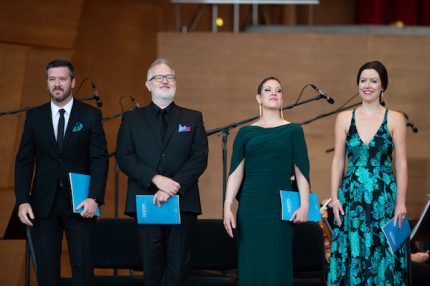Grant Park Orchestra program offers varied program, mixed results

Wednesday night’s Pritzker Pavilion concert of the Grant Park Orchestra offered some unfamiliar fare but was uneven in its delivery.
The concert began with artistic director Carlos Kalmar leading the first Grant Park Music Festival performance of Sound and Fury by British composer Anna Clyne, familiar to Chicago audiences from her stint as CSO Mead Composer-in-Residence from 2010-2015. Written in 2019, Clyne’s 15-minute opus draws inspiration jointly from Haydn’s Symphony No. 60 “Il Distratto” and Shakespeare’s Macbeth.
The results managed to feel both intriguing and diffuse. Sound and Fury begins with agitated, swirling gestures exchanged among the strings—reminiscent of the Prestissimo finale of the Haydn symphony—and a sense of unease persists more or less for its duration. Fragmentary gestures from “Il Distratto” poke through the generally dense, dissonant textures, though it was difficult to get a sense of progressive continuity on a first hearing.
Near the end, a more lush harmonic texture arrives in music that evokes a Scottish dance, and a warm bed of sound supports a spoken reading of the Scottish thane’s famous soliloquy (“Tomorrow, and tomorrow, and tomorrow…”) from which the work takes its title, delivered in a rich bass by Grant Park Chorus member Wilbur Pauley on Wednesday. The opening skittishness returns to bring the work to a close.
Parts of Sound and Fury were compelling, but the overall impression was collage-like—solid but unrelated ideas stitched together. For instance, a conspicuous quotation from the Intermezzo of Bartok’s Concerto for Orchestra appears out of nowhere, but how this reference fits into what Clyne is communicating was unclear. The Grant Park Orchestra gave the involved score stellar advocacy under Kalmar, inhabiting its variegated moods and navigating its significant technical demands.
Another Grant Park premiere followed with the first festival performance of Haydn’s “Nicolai Mass” in G Major. Composed for the name day of Haydn’s patron Prince Nikolaus Esterházy and cast for a spare orchestra, Haydn’s 1772 setting in six movements of the familiar Latin text is a typically elegant score, rich in the composer’s trademark melodic intricacies. It also seemed like a savvy programming choice to follow the Haydn-inflected Clyne opener.
In addition, it was another welcome opportunity to hear the usually reliable Grant Park Chorus prepared by longtime director Christopher Bell, following their success in Vivaldi’s Gloria last weekend.
Unfortunately, there were vocal issues throughout. The chorus’s collective timbre was superficially appealing, but consonants and passagework were muddy, pitch frequently dubious, group dynamics stuck around generalized mezzo-something, and there were many moments when the connection with the orchestra felt tenuous. It was hard to tell whether these difficulties might be attributable to the ongoing masking of chorus members—which surely had some impact—or the quick turnaround from the weekend’s performances, but whatever the reason the Grant Park Chorus has had more convincing outings.
Grant Park did field an excellent quartet of local (unmasked) soloists, however, in soprano Katelyn Lee, mezzo Sarah Ponder, tenor Hoss Brock, and bass Dan Richardson. Lee displayed a silvery tone in her contributions to the Gloria, and the quartet as a whole was excellent in the “Et incarnatus est” portion of the Gloria, with Richardson a sturdy and robust anchor. The orchestral accompaniment was at best unobtrusive, with Kalmar taking a workmanlike approach.
This continued in the reading of Beethoven’s Symphony No. 1 he led to conclude the program. “Reading” is the right word here, as the performance felt like a capable run-through, and made it easy to imagine that the intricate Clyne work got the majority of the limited Grant Park rehearsal time. The Allegro con brio lacked the called-for fire, and the moments of piquant jaggedness that adumbrate the composer’s later symphonic contributions passed without emphasis. In the Andante it did not seem like the orchestra responded to the melodic shaping Kalmar indicated, and it took the fleet Menuetto a few bars to cohere at the outset. The finale brought some zip and elan, but too little too late to lift an otherwise perfunctory outing.
The Grant Park Orchestra next performs Friday and Saturday with a program of Bernstein’s Three Dance Episodes from On the Town, Margaret Brouwer’s Concerto for Viola and Orchestra with soloist Masumi Per Rostad, and Sibelius’s Symphony No. 5. https://www.grantparkmusicfestival.com/
Posted in Performances


